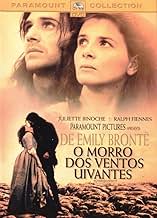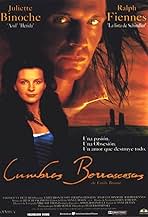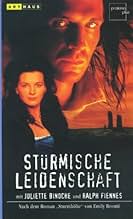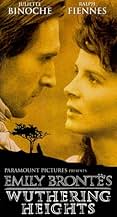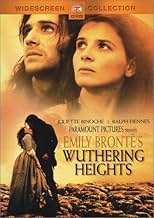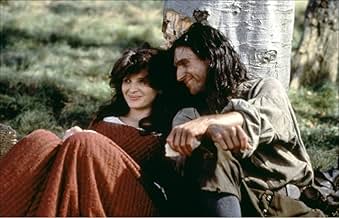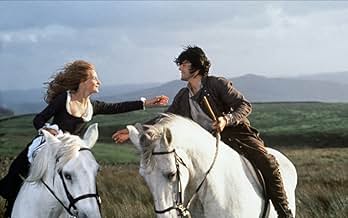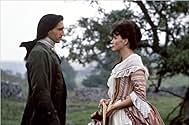Cathy et son frère adoptif sont passionnément liés depuis leur enfance passée à courir la lande. Au décès de leur père cependant, Heathcliff est ravalé socialement, et Cathy en épouse un aut... Tout lireCathy et son frère adoptif sont passionnément liés depuis leur enfance passée à courir la lande. Au décès de leur père cependant, Heathcliff est ravalé socialement, et Cathy en épouse un autre. Sa vengeance s'étendra sur deux familles et deux générations. [255]Cathy et son frère adoptif sont passionnément liés depuis leur enfance passée à courir la lande. Au décès de leur père cependant, Heathcliff est ravalé socialement, et Cathy en épouse un autre. Sa vengeance s'étendra sur deux familles et deux générations. [255]
- Réalisation
- Scénario
- Casting principal
- Récompenses
- 1 nomination au total
Avis à la une
The sensitive and masterful score by Sakamoto is almost a character in itself. Listening to it without distraction, it is almost impossible not to absorb the desolate and haunting mood of the film. The choice of locale for the movie was absolutely perfect, capturing the metaphors represented by the two great houses and the stark English moor.
This is definitely one of my favorite movies of all time, and one of the few occasions in which it may equal or even supercede the original novel. A must-see for fans of twisted period romances or anyone interested in pondering the roles of love and evil in the human soul.
The film's mistake is that it is too tentative in the first half. Director Peter Kosminsky still wanted to give viewers the conventional love story that they knew and loved so he made the first half quite gentle in order to mitigate the darker second half. Unfortunately it means that Cathy and Heathcliff's relationship is not tempestuous enough. The famous declarations- "I AM Heathcliff", "I cannot live without my soul"- are spoken quietly and demurely.
Others have mentioned Binoche's excessive giggling, which doesn't convince me that she's seventeen but rather that she's under the influence. The criticisms of her accent is unfair; she has a clear French twang but it's hardly up there in the Hall of Bad Movie Accents. Fiennes' Yorkshire accent is far worse, sounding as if he'd learnt it through watching Postman Pat episodes. His initial niceness is overdone; Heathcliff is a gentle nature-loving soul who we cannot imagine why anyone would be so mean as to beat him as his adoptive brother Hindley (Jeremy Northam) does. Binoche is far too girlish as Cathy, who is essentially a tomboy and whose wild nature makes her identify with Heathcliff.
Things only really get going when Heathcliff returns, allowing Fiennes to drop the awful accent. Kosminsky keeps the novel's framed narrative, with tenant Mr Lockwood arriving at Wuthering Heights and meeting Heathcliff and Cathy II, who he mistakes to be Heathcliff's wife. If you are unfamiliar with the novel, it may be best to locate a family tree as a handy guide. Don't worry though; Emily Bronte meant the family tree to be messy and confusing. That is why I think the double-roling of Binoche as mother and daughter works. It shows how Heathcliff sees Cathy everywhere and adds a perverse sexual tension as well. Binoche is much better as the daughter and Fiennes is stronger as older Heathcliff.
One of the good things about the adaptation is its fidelity to the novel. Using much of the novel's original dialogue, we get a truer picture of Heathcliff's cruelty. It is hard to argue that Heathcliff isn't really that bad when he beats his wife, calls her an 'abject thing' and says she 'degenerates into a mere slut'. Fiennes refreshingly doesn't try to make Heathcliff sympathetic or gloss over his actions; rather he plays a torturer who is tired of tormenting yet unable to stop himself. Heathcliff could have left the second generation alone but instead he punishes them and plays with them like chess pieces.
Whilst I do like the perversely seductive evil of Fiennes' interpretation (his performance here is what got him the role of Amon Goth in Schindler's List), like Olivier he is a little too refined to play early Heathcliff. We can never really buy him as savage; in the book, he is characterised almost like a creature rather than a human. This is why to an extent readers pity him. However Fiennes' Heathcliff is suavely evil.
The inclusion of the second half of the novel is really what recommends this film and why fans of the novel should put it top of their list of adaptations to see. Bronte did not include the main characters' children to be cute or to drag out the story. It gives the story more impact, making the film a saga of one man's bitterness rather than a doomed love story. The film keeps the wonderfully atmospheric ending of the novel and shows through the second generation that the conflict may be resolved and that the things dividing Cathy and Heathcliff will not divide this second generation. Other film adaptations ignore this small ray of optimism and hence the novel is remembered as a big misery fest. First timers to the story may find themselves lost; Wuthering Heights is an odd tale even in the generic film adaptations. The relevance of the second half may not be instantly apparent to them and will certainly be confusing if they come to it with preconceptions of the story. However a re-watch brings new subtleties and nuances that aren't present in the other film adaptations (bar elements of the dreadfully dull 2011 version).
Ironically in order to see the true nature of the story, you have to watch two flawed films (1992 and 2011). One day someone will get it right- hopefully the 1992 film has opened up doors for future films to tackle both generations.
There's something worthwhile here. That is the love story with love that was not consummated, not allowed to because they were from different worlds, because even though they connect in a deep way, the rules of the game say otherwise. Different times, but you can assume that it used to be so at Bronte's time, as it was later in Tolstoy's.
So they part, but they have grown roots so deep in each other, they cannot be parted, and distance only tears at them, distorts who they are, the distortion as memory. In the prisonworld Heathcliff creates in the end as punishing demigod of sorts, without which the story is incomplete, we can see the stark reflection of both the broader unjust world responsible for Heathcliff, and his private hell of vengeful recurring thoughts, both that stifle the soul.
All that is good enough in the film.
We get to puzzle about the name of Heathcliffe's adopted son being inscribed in a stone epigraph, on the door of a manor that was built centuries ago.
What isn't very satisfying is how we arrive at the story. The character who it is being narrated to, arrives at the manor, pores over books and images of Catherine, is captivated enough to dream of her, which leads to the housemaid's narration of the events. Instead of a dream, the visitor here sees Catherine's ghost, which sets a supernatural tone that is too obvious.
Too obvious because though even Bronte suggested ghosts, her main narrative gambit was layered dreaming, the notion that the hidden life of images and urges shapes the narrator's choosing of the story he tells about himself and things, some of which we externalize as destiny or demons, which is what we all do each time we remember, we dream of a story around a fictitious self.
But it's wonderful and moving as it is.
The story of Heathcliff and Cathy is not about love as most know it. It is MORE than love. It is a fusion, a union of two souls separated by society and circumstance, yet bonded so completely that even death could not sever them. Love beyond pain, beyond place, beyond reason.
Never has an adaptation brought this classic Victorian novel so completely to the screen. That, in itself, is high praise. Wuthering Heights had been made 14 times before this, the 1992 incarnation. It is the only version to tell the complete story in all of its dark detail. It is also the LAST time, to date, it has been made. And that should be the highest praise of all.
Why? Because there is no need to do it again. It cannot be improved upon beyond this. Yes, the movie can be a bit confusing, even abrupt in the plot shifts for those who have never read the book. But for those who have: Anne Devlin treats her screenplay with reverence for Emily Bronte's novel. Many whole scenes are intact, the dialog exactly as written originally. The scenery was breathtaking. And the house, the Heights itself, was perfect. Still standing there, after centuries, keeping its own secrets in the silence of its stones.
The cast of actors includes not one single Hollywood darling. Thank God. They would have ruined it. But, because the cast is not overly well known in the US, you concentrate on the PERFORMANCES rather than the performers.
And, it is in these performances this film rises above its predecessors. The actors all turn in solid efforts. Each is true to character, from selfish Cathy (Juliette Binoche) to vapid Isabella (Sophie Ward). Simon Shepherd's Edgar Linton is far more likable than the novel. His portrayal is an improvement on the original, and you actually pity him for being caught between Cathy and Heathcliff.
Heathcliff. An immortal character, like Sherlock Holmes, or Hamlet. Sir Laurence Olivier, arguably the best Hamlet, played Heathcliff in the 1939 version opposite Merle Oberon as Cathy. Until tonight, I thought his was the best Heathcliff, as well. Until tonight.
Tonight I watched Ralph Fiennes play Heathcliff. No, not play. He BECAME Heathcliff. Bronte's Heathcliff. A Heathcliff I had always pictured clearly in my mind, but had NEVER seen before my eyes. Before tonight. This man is RIVETING. He commands the story, seizing it, wrenching it to his will as Heathcliff does the lives of those around him.
Yet, you do not hate him for it. Rather, you ache for him. You look into his eyes and feel every rip in his soul, the agony of every jagged edge in his shattered heart. You watch him wear his cruelty like a mantle, lashing out at a world which denies him the only thing he has ever wanted, the only thing which will make him whole. I cry at movies all the time. Seldom, though, am I torn in a grief so absolute I am left at the end empty, and spent.
I don't know much about Ralph Fiennes work. I tend to like films that deal in anything BUT reality, so have not seen much of him. I loved Red Dragon, but until I read his filmography, I never connected Francis Dolarhyde to Heathcliff, which is perhaps the greatest compliment one can give an actor. Fiennes alone is the reason you cannot improve on this film. No one could ever bring Heathcliff to life like this. The role belongs to him.
I have loved Emily Bronte's novel since childhood. I have read it often. But now, something has changed it for me, forever. No matter how many times I may read Wuthering Heights in future, after tonight, I know I shall never again read it without seeing the face, or hearing the voice, of Ralph Fiennes.
Le saviez-vous
- AnecdotesSinéad O'Connor makes an uncredited appearance as Emily Bronte.
- Citations
Heathcliff: I pray one prayer, I repeat it till my tongue stiffens. Catherine Earnshaw, may you not rest as long as I am living! You said I killed you, haunt me, then!... Be with me always, take any form, drive me mad, only do not leave me in this abyss, where I cannot find you!... I cannot live without my life. I cannot live without my soul.
- ConnexionsFeatured in MsMojo: Top 10 Movie Couples Who Are Actually Toxic (2019)
Meilleurs choix
- How long is Wuthering Heights?Alimenté par Alexa
Détails
- Date de sortie
- Pays d’origine
- Sites officiels
- Langue
- Aussi connu sous le nom de
- Wuthering Heights
- Lieux de tournage
- East Riddlesden Hall, Bradford Road, Riddlesden, Keighley, Bradford, West Yorkshire, Angleterre, Royaume-Uni(Heathcliff works in the carding shed)
- Société de production
- Voir plus de crédits d'entreprise sur IMDbPro
- Durée1 heure 45 minutes
- Rapport de forme
- 1.85 : 1
Contribuer à cette page



